Total Quality Management (TQM) Implementation at Tesco: A Report
VerifiedAdded on 2023/01/13
|5
|954
|69
Report
AI Summary
This report examines the implementation of Total Quality Management (TQM) at Tesco, focusing on key factors contributing to its success. It highlights the benefits of TQM, such as continuous cost reduction, market expansion through partnerships, and excellent customer service. The report details the steps involved in TQM implementation, including conducting studies, obtaining commitment, staff education, and reviewing progress. It also explores Tesco's approaches to cost collection, employee perspectives on management, and the use of the PQASSO program. The report provides a comprehensive analysis of Tesco's TQM strategies and their impact on the company's performance, supported by references to relevant literature.
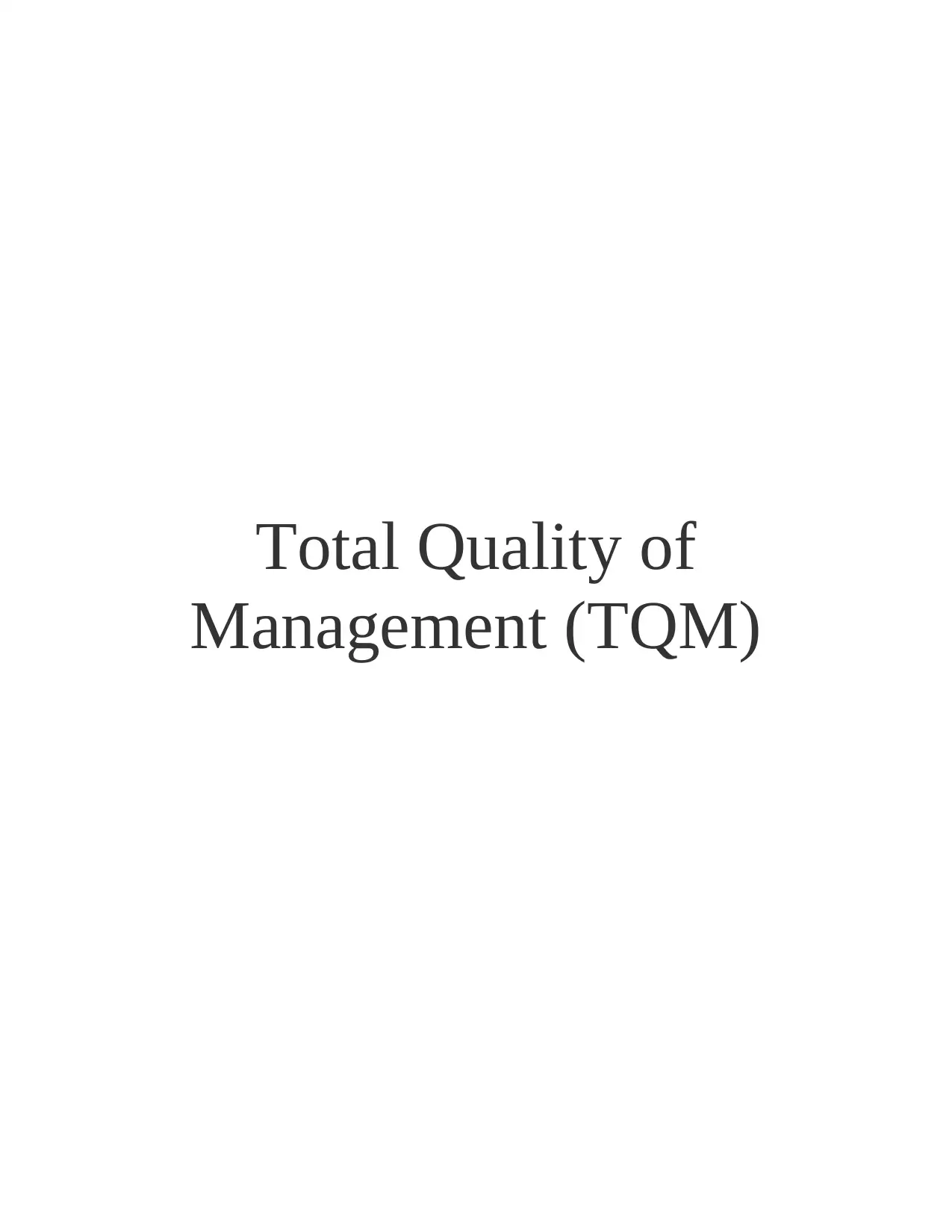
Total Quality of
Management (TQM)
Management (TQM)
Paraphrase This Document
Need a fresh take? Get an instant paraphrase of this document with our AI Paraphraser
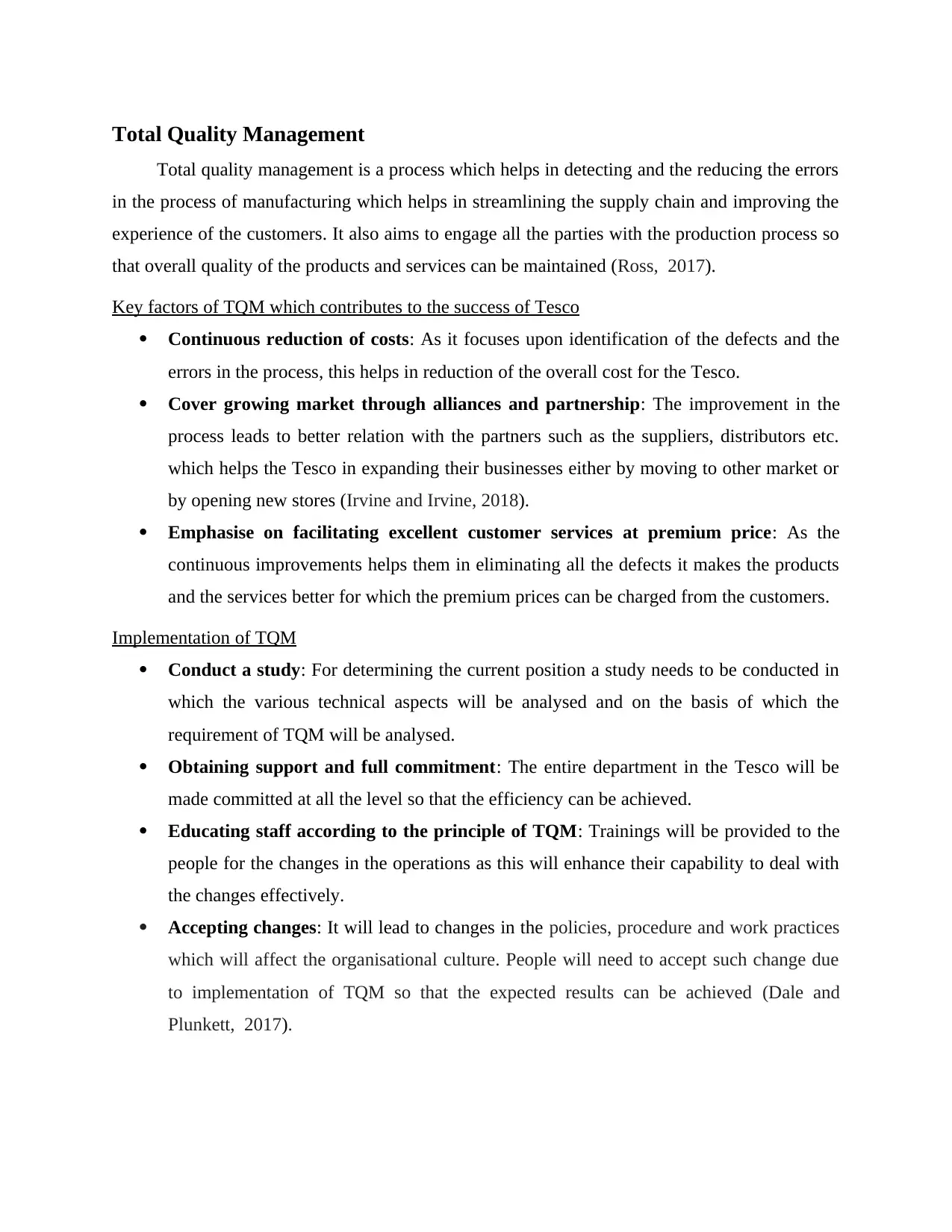
Total Quality Management
Total quality management is a process which helps in detecting and the reducing the errors
in the process of manufacturing which helps in streamlining the supply chain and improving the
experience of the customers. It also aims to engage all the parties with the production process so
that overall quality of the products and services can be maintained (Ross, 2017).
Key factors of TQM which contributes to the success of Tesco
Continuous reduction of costs: As it focuses upon identification of the defects and the
errors in the process, this helps in reduction of the overall cost for the Tesco.
Cover growing market through alliances and partnership: The improvement in the
process leads to better relation with the partners such as the suppliers, distributors etc.
which helps the Tesco in expanding their businesses either by moving to other market or
by opening new stores (Irvine and Irvine, 2018).
Emphasise on facilitating excellent customer services at premium price: As the
continuous improvements helps them in eliminating all the defects it makes the products
and the services better for which the premium prices can be charged from the customers.
Implementation of TQM
Conduct a study: For determining the current position a study needs to be conducted in
which the various technical aspects will be analysed and on the basis of which the
requirement of TQM will be analysed.
Obtaining support and full commitment: The entire department in the Tesco will be
made committed at all the level so that the efficiency can be achieved.
Educating staff according to the principle of TQM: Trainings will be provided to the
people for the changes in the operations as this will enhance their capability to deal with
the changes effectively.
Accepting changes: It will lead to changes in the policies, procedure and work practices
which will affect the organisational culture. People will need to accept such change due
to implementation of TQM so that the expected results can be achieved (Dale and
Plunkett, 2017).
Total quality management is a process which helps in detecting and the reducing the errors
in the process of manufacturing which helps in streamlining the supply chain and improving the
experience of the customers. It also aims to engage all the parties with the production process so
that overall quality of the products and services can be maintained (Ross, 2017).
Key factors of TQM which contributes to the success of Tesco
Continuous reduction of costs: As it focuses upon identification of the defects and the
errors in the process, this helps in reduction of the overall cost for the Tesco.
Cover growing market through alliances and partnership: The improvement in the
process leads to better relation with the partners such as the suppliers, distributors etc.
which helps the Tesco in expanding their businesses either by moving to other market or
by opening new stores (Irvine and Irvine, 2018).
Emphasise on facilitating excellent customer services at premium price: As the
continuous improvements helps them in eliminating all the defects it makes the products
and the services better for which the premium prices can be charged from the customers.
Implementation of TQM
Conduct a study: For determining the current position a study needs to be conducted in
which the various technical aspects will be analysed and on the basis of which the
requirement of TQM will be analysed.
Obtaining support and full commitment: The entire department in the Tesco will be
made committed at all the level so that the efficiency can be achieved.
Educating staff according to the principle of TQM: Trainings will be provided to the
people for the changes in the operations as this will enhance their capability to deal with
the changes effectively.
Accepting changes: It will lead to changes in the policies, procedure and work practices
which will affect the organisational culture. People will need to accept such change due
to implementation of TQM so that the expected results can be achieved (Dale and
Plunkett, 2017).
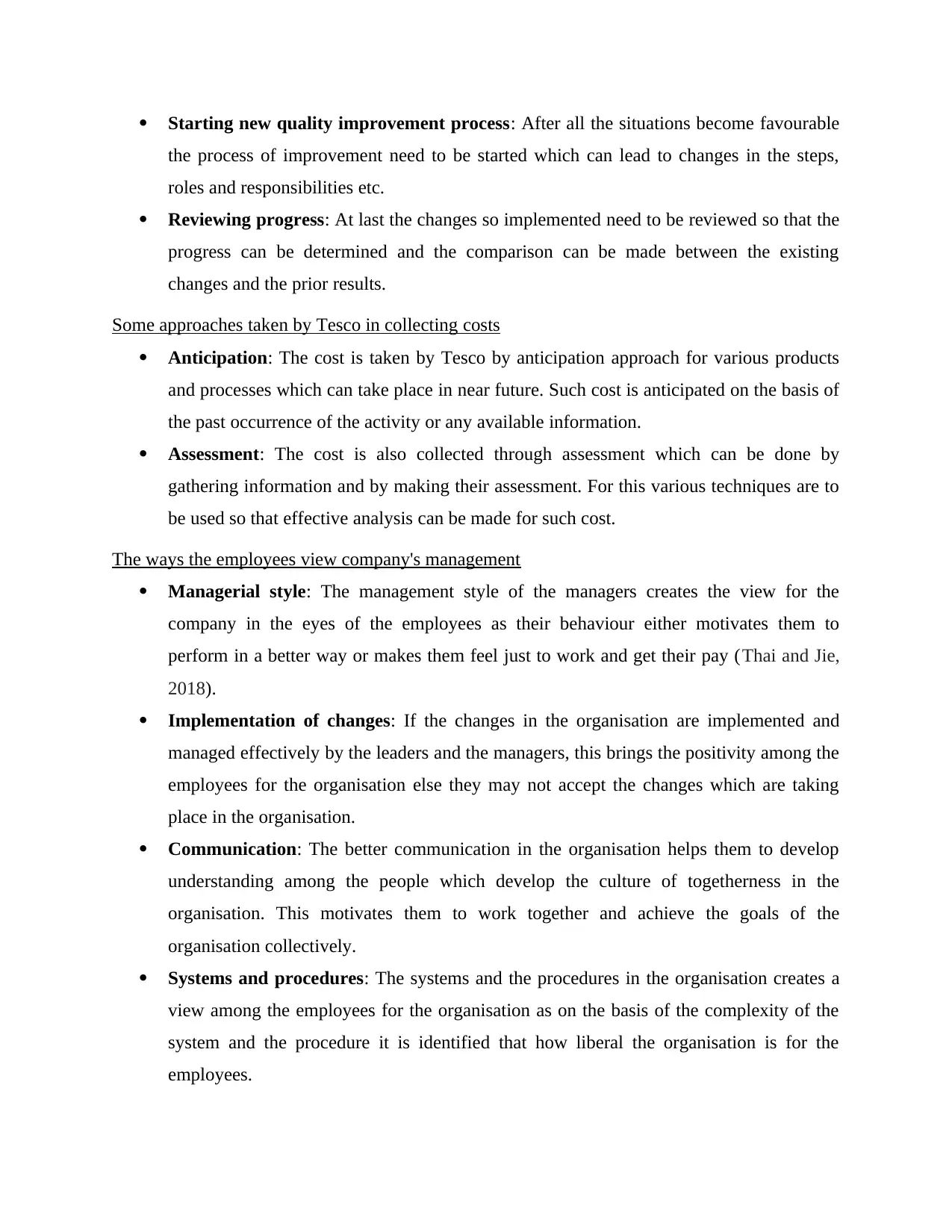
Starting new quality improvement process: After all the situations become favourable
the process of improvement need to be started which can lead to changes in the steps,
roles and responsibilities etc.
Reviewing progress: At last the changes so implemented need to be reviewed so that the
progress can be determined and the comparison can be made between the existing
changes and the prior results.
Some approaches taken by Tesco in collecting costs
Anticipation: The cost is taken by Tesco by anticipation approach for various products
and processes which can take place in near future. Such cost is anticipated on the basis of
the past occurrence of the activity or any available information.
Assessment: The cost is also collected through assessment which can be done by
gathering information and by making their assessment. For this various techniques are to
be used so that effective analysis can be made for such cost.
The ways the employees view company's management
Managerial style: The management style of the managers creates the view for the
company in the eyes of the employees as their behaviour either motivates them to
perform in a better way or makes them feel just to work and get their pay (Thai and Jie,
2018).
Implementation of changes: If the changes in the organisation are implemented and
managed effectively by the leaders and the managers, this brings the positivity among the
employees for the organisation else they may not accept the changes which are taking
place in the organisation.
Communication: The better communication in the organisation helps them to develop
understanding among the people which develop the culture of togetherness in the
organisation. This motivates them to work together and achieve the goals of the
organisation collectively.
Systems and procedures: The systems and the procedures in the organisation creates a
view among the employees for the organisation as on the basis of the complexity of the
system and the procedure it is identified that how liberal the organisation is for the
employees.
the process of improvement need to be started which can lead to changes in the steps,
roles and responsibilities etc.
Reviewing progress: At last the changes so implemented need to be reviewed so that the
progress can be determined and the comparison can be made between the existing
changes and the prior results.
Some approaches taken by Tesco in collecting costs
Anticipation: The cost is taken by Tesco by anticipation approach for various products
and processes which can take place in near future. Such cost is anticipated on the basis of
the past occurrence of the activity or any available information.
Assessment: The cost is also collected through assessment which can be done by
gathering information and by making their assessment. For this various techniques are to
be used so that effective analysis can be made for such cost.
The ways the employees view company's management
Managerial style: The management style of the managers creates the view for the
company in the eyes of the employees as their behaviour either motivates them to
perform in a better way or makes them feel just to work and get their pay (Thai and Jie,
2018).
Implementation of changes: If the changes in the organisation are implemented and
managed effectively by the leaders and the managers, this brings the positivity among the
employees for the organisation else they may not accept the changes which are taking
place in the organisation.
Communication: The better communication in the organisation helps them to develop
understanding among the people which develop the culture of togetherness in the
organisation. This motivates them to work together and achieve the goals of the
organisation collectively.
Systems and procedures: The systems and the procedures in the organisation creates a
view among the employees for the organisation as on the basis of the complexity of the
system and the procedure it is identified that how liberal the organisation is for the
employees.
⊘ This is a preview!⊘
Do you want full access?
Subscribe today to unlock all pages.

Trusted by 1+ million students worldwide
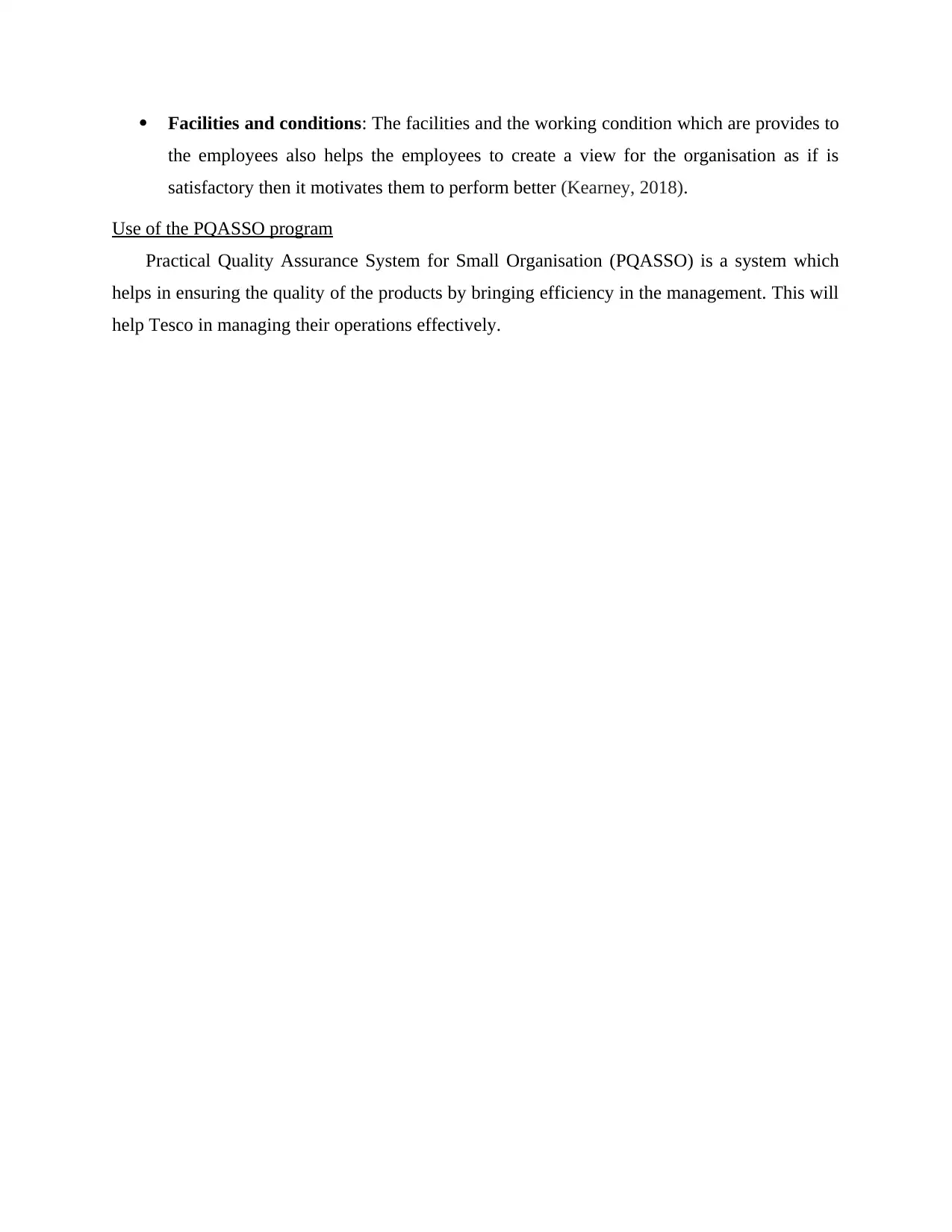
Facilities and conditions: The facilities and the working condition which are provides to
the employees also helps the employees to create a view for the organisation as if is
satisfactory then it motivates them to perform better (Kearney, 2018).
Use of the PQASSO program
Practical Quality Assurance System for Small Organisation (PQASSO) is a system which
helps in ensuring the quality of the products by bringing efficiency in the management. This will
help Tesco in managing their operations effectively.
the employees also helps the employees to create a view for the organisation as if is
satisfactory then it motivates them to perform better (Kearney, 2018).
Use of the PQASSO program
Practical Quality Assurance System for Small Organisation (PQASSO) is a system which
helps in ensuring the quality of the products by bringing efficiency in the management. This will
help Tesco in managing their operations effectively.
Paraphrase This Document
Need a fresh take? Get an instant paraphrase of this document with our AI Paraphraser
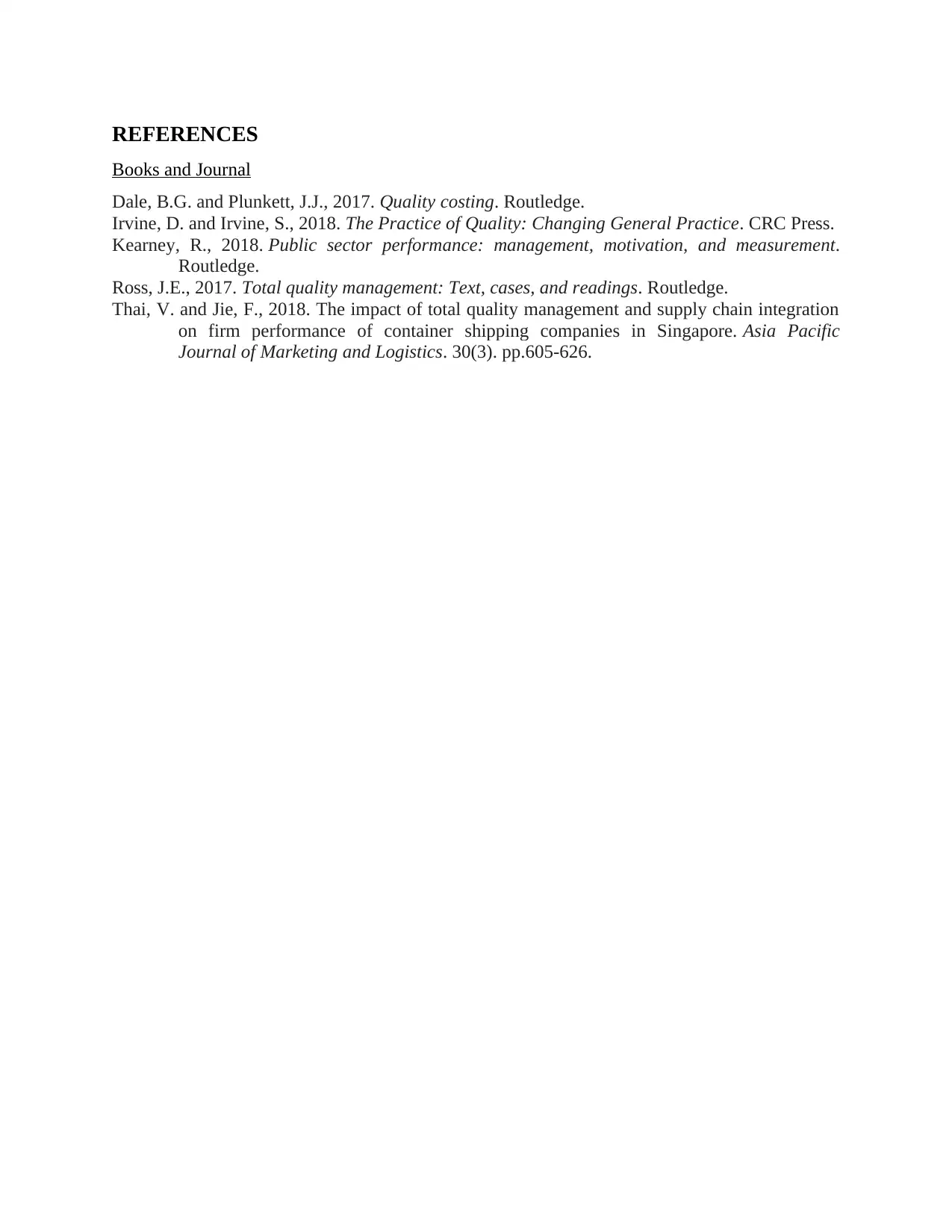
REFERENCES
Books and Journal
Dale, B.G. and Plunkett, J.J., 2017. Quality costing. Routledge.
Irvine, D. and Irvine, S., 2018. The Practice of Quality: Changing General Practice. CRC Press.
Kearney, R., 2018. Public sector performance: management, motivation, and measurement.
Routledge.
Ross, J.E., 2017. Total quality management: Text, cases, and readings. Routledge.
Thai, V. and Jie, F., 2018. The impact of total quality management and supply chain integration
on firm performance of container shipping companies in Singapore. Asia Pacific
Journal of Marketing and Logistics. 30(3). pp.605-626.
Books and Journal
Dale, B.G. and Plunkett, J.J., 2017. Quality costing. Routledge.
Irvine, D. and Irvine, S., 2018. The Practice of Quality: Changing General Practice. CRC Press.
Kearney, R., 2018. Public sector performance: management, motivation, and measurement.
Routledge.
Ross, J.E., 2017. Total quality management: Text, cases, and readings. Routledge.
Thai, V. and Jie, F., 2018. The impact of total quality management and supply chain integration
on firm performance of container shipping companies in Singapore. Asia Pacific
Journal of Marketing and Logistics. 30(3). pp.605-626.
1 out of 5
Related Documents
Your All-in-One AI-Powered Toolkit for Academic Success.
+13062052269
info@desklib.com
Available 24*7 on WhatsApp / Email
![[object Object]](/_next/static/media/star-bottom.7253800d.svg)
Unlock your academic potential
Copyright © 2020–2026 A2Z Services. All Rights Reserved. Developed and managed by ZUCOL.





